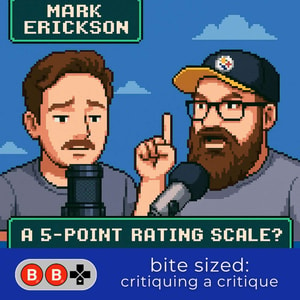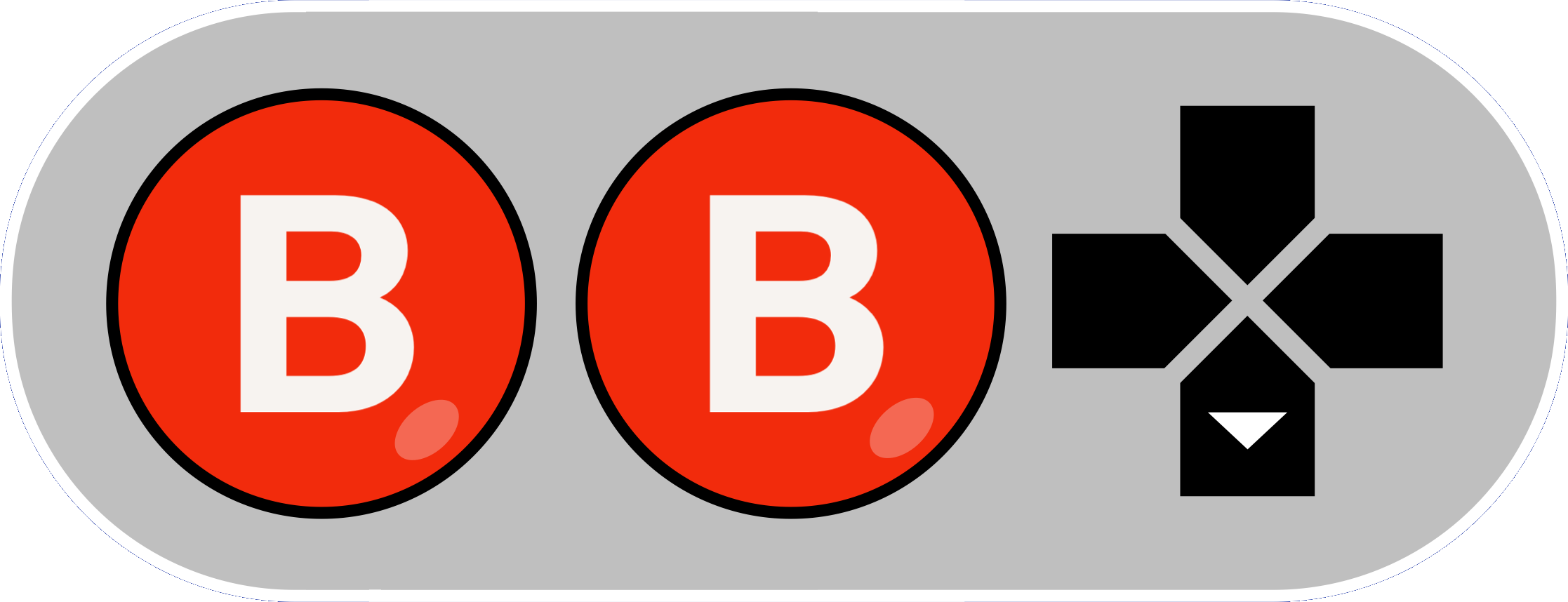bite sized: critiquing a critique

Transcript
Hey guys, it's Nate and it's time for another bite size. So I will endeavor to be okay at Brevity. I'm not guaranteeing anything because if you guys have been paying attention for any amount of time, you know that I'm just not great at that, especially when my co host and I are sort of doing it together. But I wanted to sort of just run something by you. And so this one is called this episode. This bite sized rather is, it's called a critique of a critique. And recently friend of the show Mark Erickson over at Quickplay released an episode, I think it's episode 116 where he basically kind of goes after the 10 point review system that a lot of outlets use and just as general, you know, that we use and you know, frankly, I think he makes some really interesting and worthwhile points. He talks about the fact that, you know, a lot of the, the bulk of, Even in the 10 point scale, the bulk of sort of games that release sort of release in this, like I think it was either 60 or 70 to like you know, 90, etc. And so there's a pretty significant chunk of that, that sort of, that range that just doesn't get used as a general rule. And so he lays out and his, his argument, his position for using a five point system and it's, it's pretty compelling. You know, I, I think it's a good. Listen, I think you ought to go check it out, you know. And again, just wanted to sort of give Mark a little bit of shine here because love that dude, I love his content, love what he's doing over there, but I have some pushback or I have a critique of his critique. And so one of the things I think, you know, I don't want to put words into his mouth but he sort of said that we need to get rid of some of the extraneous sort of non usable data, sort of simplify things and really put an emphasis on creating conversation and with his system and it's not a bad system, I just think it could be better because if we're looking for simplicity and if we really do understand that any sort of review or you know, or sort of even conversation about a game really does boil down to you want to know as a consumer, you want to know, should I buy this, should I play this or should I pass on it? And so my position is that it should be pass or play. You either pass on the game or the you play it, right? And so that's, that's When I write a review over on gg, you know, sometimes I write reviews for the games I'm playing over there. And there's just little things because, you know, I think that the fact of the matter is. And again, Mark makes the point that a lot of times when people are reading these, these longer form reviews, they just kind of go to the bottom. They look for the number and what they're really looking for is information there to saying like, should I buy this? Should I play this? Or is it should I just do something better with my time or just play a different game altogether? And so in sort of even stripping it down to the much more almost like brutalist approach here, I think we just need to say games are passes or their plays. Now there's gradation there and there is sort of a nuance and there's a way that you could probably say that like my system balloons out to sort of a five point system, right? Because there is this kind of like a game is a play or it's a pass, right? But there is sort of some nuance there. So I have should plays, like games that I think most people should play. I have must plays, games that I think are absolutely essential to if a video game canon exists. These games belong to that I have should pass. You know, where it's kind of like this is. I think for most people this game is not appropriate, suitable or worthwhile. There's must pass. But with the should pass, there's kind of like there might be some redeeming quality quality in there. I just didn't think it was worth it. You know, the, the meat wasn't worth fighting with the bones on that one. And then there's must pass where it's like, this thing is just. Don't even look at it. This is, it's either just busted or whatever. But I don't really, you know, and that's the thing is like, I don't really. I actually, I'll have a conversation about that and I might even explain that in the, like in the, in the review that I write, but I don't actually use it. It's just, this is a pass. Like you can pass on this and feel okay about that decision or you can play it. Because if you're reading those reviews or you're watching one of the long form videos where Josh and I are having conversations about games, that's what you're really interested in. You want to know, like, you're after my opinion, you're after Josh's opinion, or you're after some sort of writer's opinion or whoever. But the point of you sort of consuming that kind of material is that you want to know whether you think a game is worth playing or you should play a game and you're using me or somebody else, you know, some other reviewer or critic or whatever as a reference point. And our tastes either align or they don't. And so sometimes I, you know, if you're a person whose gaming tastes run completely counter to mine, but you know, for some reason would listen to the content and Nate's like, I really like this game. You know, you maybe to a fair degree of certainly say certainty, say, I don't know that I would like this game. Or maybe sometimes the way that I speak about a game, you know, says like, hey, you know, typically I don't really agree with Nate. I don't really line up with his opinions. But that's, but this sounds interesting enough. And see, and that's the real meat of it is that these, these conversations, if you're just looking for sort of like the, the confirmation that hey, I want this, I need to know if it's going to be worth my time or it's not worth my time, like you're, I think that's all you do anyways. And I think it is much more helpful to use sort of a, a thumbs up or thumbs down approach. Like, yeah, like this is an affirmative, this is a negative. I think that at the end of the day it, it actually if, if that's the critical information you want and that you're looking for out of a review, we ought to just do pass and plays. And then what that would actually do is if you want to know about some of the nuanced stuff, like you could go back, read the review, you could listen to the conversation surrounding the, the game, you know, and you could have a more informed kind of opinion. But anyways, I mean that's, that's really it. Like, I think, you know, I, again, I wanted to just sort of give Mark a little bit of a shout out and a little bit of shine because I think it's a, I think he just does a bang up job over there and I think, you know, his opinion is worth listening to. I just happen to think that we can go even further, you know, and I'm not, I am not one for just needlessly sort of like, just like I'm not, I'm not a brutalist, I'm not like a strict rationalist where I think we need to sort of like peel everything down to its. Its bones. I think that sometimes having a little fat there, having a little fluff is good, but I think that this is a situation where a more minimalist approach, I think, could possibly cultivate a just a healthier sort of dialogue and a healthier sort of community of fandoms. If we just, you know, if we kind of give again, sort of, we make it a simple binary and we say, yes, this is worth playing or no, it's not, and then have a conversation and, you know, and again, for the people who are going to opt out of the, the, the longer form review or, you know, the sort of, the, the more nuanced perspective, well, then you've got, you've got the critical information, you know, you, you know, according to X, Y or Z, you know, it's, it's playable whether or not it's. It's for you or not. So. Yeah, anyways, guys, I, I didn't, you know, I said I didn't think this one was going to be long, but, yeah, it's not. So that being said, hey, go check out Mark's episode, you know, and maybe if, if my sort of position isn't compelling, maybe his will be. But, yeah, that's all I got, guys. And, you know, so just wanted to thank you for hanging out. Thank you for listening, watching, doing the rating and the reviewing. And I just want to say, until next time, guys, be good and do the things.
On this bite sized episode, Nate addresses his concerns with Quick Play's 5-point rating scale.
Check out the Quick Play episode where Mark breaks down his thoughts here: https://www.youtube.com/watch?v=cL8hsiJxJFA
We'd love to hear from you! Join us on our social media by checking out our Linktree: https://linktr.ee/thebacklogbreakdown
And if you'd like to support us, you can visit our Patreon: https://www.patreon.com/thebacklogbreakdown
The Backlog Breakdown is a proud member of the Play Well Network, a network of podcasts that seek to approach recreation in a more thoughtful manner. Until there is a rabbit trail to follow. Check out all of the other amazing Play Well podcasts at playwellnetwork.com. Get PWNed, scrubs.
